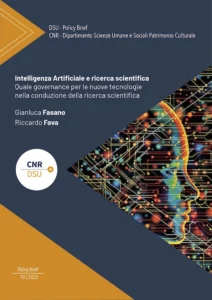
DSU Policy Brief 10-25
Artificial Intelligence and scientific research
What governance for new technologies in conducting scientific research
Gianluca Fasanoa, Riccardo Favab
a CNR-ISTC, Istituto di Scienze e Tecnologie della Cognizione
b CNR-ISSIRFA, Istituto di studi sui sistemi regionali federali e sulle autonomie “Massimo Severo Giannini”
DOI: 10.36134/PBDSU-2025-10 Download as .PDF
The development and rapid diffusion of Artificial Intelligence (AI) systems, especially those related to deep learning, generative AI and basic models, raise complex questions regarding the governance of scientific research.
The growing integration of AI in many intellectual activities is also profoundly changing the way research is done, intervening in essential phases such as data collection and analysis, theoretical modelling and the publication of results. This means that the discussions that have arisen around the self-learning, autonomy and creativity of AI systems, among others, cannot only represent the object of research investigation but must be placed at the center of policymakers’ reflections, to stimulate governance choices to protect the freedom of science.
In this context, the scientific community is called upon to adopt policies that give adequate attention to these issues, to ensure that scientific research continues to represent that ethical-social dimension in which to guarantee “the full development of the human person”.
How to cite
Fasano, G., Fava, R. (2025). Intelligenza Artificiale e ricerca scientifica. Quale governance per le nuove tecnologie nella conduzione della ricerca scientifica (DSU Policy brief 10). CNR-Dipartimento di Scienze Umane e Sociali, Patrimonio culturale. https://doi.org/10.36134/PBDSU-2025-10.
Last updated: 14 March 2025

